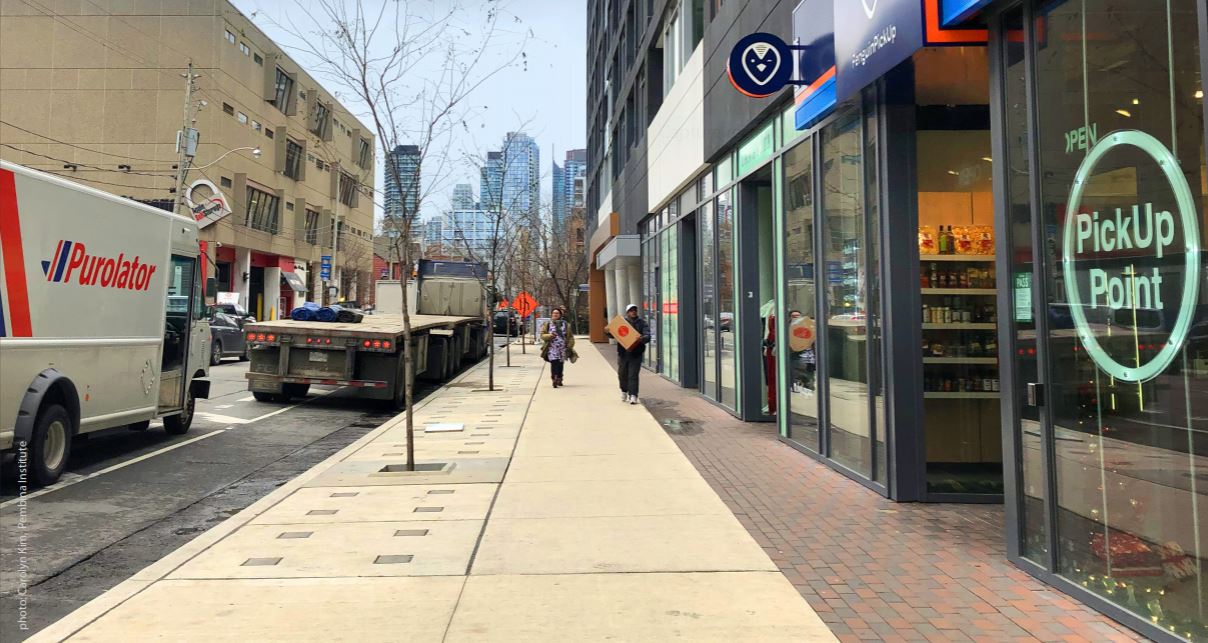Delivering Last-Mile Solutions
A feasibility analysis of microhubs and cyclelogistics in the GTHA
Transportation is responsible for approximately one-third of greenhouse gas emissions in Ontario. Freight transportation in particular is a major contributor to emissions — by 2030, it is expected that freight emissions in Canada will exceed passenger emissions. As e-commerce activity and the demand for same-day and home deliveries increases, it is expected that more freight vehicles will be on the road, not only contributing to increased emissions, but also traffic congestion, noise on our streets, and greater competition for the curbside.
Decarbonizing urban freight in Canada (27 février 2020)
In light of growing populations and a rapidly growing e-commerce sector, Canadian cities are developing strategies to electrify cars and trucks, implementing new tactics to manage growing curbside demand from commercial delivery vehicles, partnering with businesses to test new delivery technologies and practices, and investigating best practices from around the world to manage goods movement. This report highlights trends and actions in Vancouver, Calgary, Edmonton, the Greater Toronto and Hamilton Area, Ottawa, Montreal, and Halifax.
However, the current ad hoc city-by-city approach to solving the urban freight problem means that municipal bureaucrats and politicians are reinventing the wheel, so to speak, all across Canada. By coming together and sharing learnings, cities can move forward faster on solving this growing problem in concert with business and other levels of government, saving much sought-after municipal resources at the same time.
Businesses stand to gain substantially from a national approach, particularly those that have multi-province and/or national operations. Businesses need solutions that can be scaled up economically across the country. Like any other clean economy policy, the business community needs clarity and consistency to achieve efficiencies and economies of scale.
Consistent, coherent and co-ordinated policy approaches make sense for all parties involved, and will benefit the majority of Canadians who live in these urban centres.
To that end, Pembina Institute recommends:
- A national dialogue on urban freight to improve the environment and livability of cities across Canada
- Modernized goods distribution in urban centres, developed by combination of policy makers, industry, private sector and the public
- Goods movement strategies that are integrated with existing climate, land use, road safety and transportation strategies with which they are inherently interconnected
- Nationally consistent municipal-level freight data collection programs that inform effective goods movement strategies that can be scaled up across Canada.
Organisations utilisatrices ou intéressées pour utiliser la ressource : Coop Carbone, Le centre d’excellence des communs technologiques pour la mobilité
Contributeur(s) :
Tags :
Catégories : Connaissance
Thème : Logistique urbaine, Centre Excellence Québec
Référent :
Défi auquel répond la ressource :
Personnes clés à solliciter :
Autre commun proche :
Richesse recherchée :
Compétences recherchées :
Communauté d'intérêt :
Type de licence :
Conditions Générales d’Utilisation (CGU) :
Niveau de développement :
Lien vers l’outil de gestion des actions :
Lien vers l’outil de partage de fichiers :
Besoins :
Prochaines étapes :
Documentation des expérimentations :
Autres informations
Liste des acteurs qui utilisent ou souhaitent utiliser ce commun :
Liste des CR d’atelier en lien avec ce commun :

 Français
Français English
English Italiano
Italiano